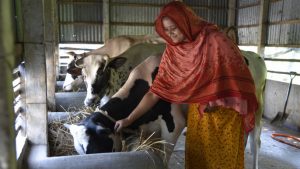Research scientist at Veterinary Public Health Section of Livestock and Dairy Development Department KP has warned of threats to public health posed by a zoonotic Bovine Tuberculosis (TB) disease and stressed for guidance of dairy farmers and animals handlers about the risk factors caused by this highly contagious infectious disease mostly spread through cattle.
“Bovine Tuberculosis (BTB) is a chronic, debilitating and highly contagious zoonotic disease threatening public health and animals both domestic and wild,” says Dr. Maleeha Anwar, Research Officer TB and VPH (Veterinary and Public Health) Section of Livestock and Dairy Development Department Khyber Pakhtunkhwa.
BTB, caused by M. bovis pathogen, has great potential to infect human and other animals due to its broad range of host and this disease has considerable economic and public health importance due to its occurrence in various animal species and their products used for human consumption, warns Dr. Maleeha while talking with APP.
According to a study, prevalence of TB in cattle and buffaloes in Pakistan was found to be at a ratio of 5.1 percent to 1.76 percent respectively.
While its prevalence in Khyber Pakhtunkhwa is reported around 345 per one lakh and the incidence rate in person is 264 per one lakh, Dr. Maleeha shared.
She said in 2018, a PhD student during his research on disease, registered four percent of cases while isolation of cases at Khyber Teaching Hospital of Peshawar.
The disease needs a lot of research and awareness among masses, health staffers, veterinary doctors and public health officials about the serious threat posed by this fatal disease both the humans and animals, she suggested.
Quoting some research findings, Dr. Maleeha said it has been reported that three percent of all human tuberculosis cases are caused by M. bovis through close contacts with livestock or consumption of raw milk and its products.
Recently a research study in Kohat district of KP reported prevalence of TB from tissue samples of ruminants collected from abattoir.
The study conducted in five union councils of Kohat by collecting 200 milk samples from lactating animals including cattle, buffaloes and goats, found 13.5 samples as positive. While the overall PCR
(polymerase chain reaction) based prevalence in milk samples were determined to be 7.5 percent.
During the survey, the animal herds with poor hygienic conditions found with highest prevalence rate (35.5) of tuberculosis whereas 18.5 percent and 13 percent cases were investigated in the herds with moderate to good hygienic conditions.
Moreover, high prevalence rate was recorded in animals with age greater than eight years and mostly farmers (47.5 percent) were sharing their own living houses with cattle at night.
On the basis of study findings, it is perceived that milk throughout the marketing chain from farm to consumer may harbor M. bovis which could be a source of infection in those areas.
Another critical and contributing factor for spread of the disease to human is especially through farmers, dairy workers associated with poorly ventilated houses.
Dr. Maleeha Anwar suggested for proper guidance of daily farmers and other related people about the high occurrence of tuberculosis in milk samples and screening of disease be adopted on routine basis in animals.
She said dairy farmers and animal owners should also be educated about symptoms of TB in animals like prolong coughing, weakness and loss of appetite.
They should also be informed about causes of spread of disease from animal to human especially because of travel of bacteria in air and consumption of milk.
About cure of infected animals, she said it is a lengthy and costly procedure which are mostly avoided by owners who in case of prolong illness prefer to sell the animal to butcher for human consumption.
Dr. Maleeha also recommended the test of TB at the abattoir for animals brought for slaughter. Though she said there is no such evidence of infection from the consumption of meat of sick animals, but this needs to be further investigated.
The government should also take measures for ensuring the consumption of only pasteurized milk for ensuring public health safety.
A subsidy should also be given from the government to farmers as a support in treatment of infected animals which is mostly avoided due to high cost of different antibiotics, she went on to say.













